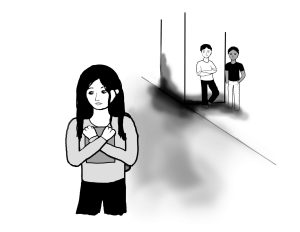Buddhism has become attractive to a certain type of American who would fit right in at Whitman. I would describe this type as liberal, peaceful and earthy. I think individuals who fit the type would describe themselves as “spiritual.”
In defining themselves as “spiritual,” these people are conspicuously avoiding being identified as “religious.” Yet, at the same time, they do not want to be or come across as cold, hard atheists. They want to gain access to the depth of that other mysterious realm. But they don’t want to do it in the “old” way. 
In fact, these people are often strongly opposed to organized religion, and especially to fundamentalist Christians. In the hyper-PC environment of Whitman, people bash Christian fundamentalist ideals on a daily basis and feel just fine about it. “Who would wait to have sex until you’re married? That’s a horribly repressive practice that forces you into marriage way too young and starts you popping out babies. And what is worse than a house full of babies? Gross.”
Buddhism seems to offer just what they seek: spirituality without deism. Instead of worshipping a god who lays down all these oppressive rules, a Buddhist simply works on cultivating his own spirit and improving his way of life. There is no heaven or hell. The focus is on how one lives here and now in this world.
However, in terms of guidelines about how one should live one’s life, Buddhism is actually remarkably similar to fundamental Christianity. Both emphasize strictly controlling one’s passions and desires, to the point of nearly annihilating them. Romans 13:12-14 reads, “let us live honorably as in the day, not in reveling and drunkenness, not in debauchery and licentiousness, not in quarreling and jealousy. Instead, put on the Lord Jesus Christ, and make no provision for the flesh, to gratify its desires.” In Christianity, the desires of the body are seen as sinful things that should be kept under tight rein.
Buddhism does not conceive of lusts as sinful and leading to eternal punishment but rather as limiting and leading to suffering here on earth. However, the emphasis on tightly reining in or even altogether abolishing desire is essentially the same. One of the sacred Buddhist texts, the Ketokhila Sutta, reads, “Whatever brother, O Bhikkus, has got rid of the passion after a body, has got rid of the desire after a body, has got rid of the attraction after a body, has got rid of the thirst after a body, has got rid of the craving after a body, his mind does incline to zeal, exertion, perseverance and struggle.” These latter qualities related to self-control are part of the goal of Buddhist practice, and passions are seen as serious impediments that must be completely renounced. If anything, Buddhism is stricter than Christianity in that it encourages complete renunciation of desire in any form rather than merely control over it.
If the “spiritual” people are speaking with etymological awareness when they define themselves this way, then they are right to turn to Buddhism. Buddhism is in fact a religion of the spirit, not of the body. But I doubt that many of these people are really looking for the kind of self-discipline that Buddhism really demands.
I, by the way, am one of these liberal, peaceful, earthy Americans. I probably believe more strongly in self-discipline than most people of this type. But while some aspects of Buddhism do intrigue me, I definitely do not want to embrace its doctrine of the abolition of desire.
I want a religion that works with our nature as human beings instead of fighting against it. While we are not mere animals in that we can to some extent control our desires, we are still animals in that we have naturally have strong desires. These desires are what makes life so exhilarating. What would eating a salad be without hunger? Or kissing without the desire to be united with another being? Don’t tell me I should not eat for pleasure and should not kiss. These are the joys of living. And it is the desire involved in them that makes them so joyful. Even desiring to kiss without kissing is the loveliest feeling: thick with pain and pleasure like a complex, vaguely dissonant chord.
I would not consider myself “un-spiritual.” There is a vast difference between blindly letting your desires run wild and celebrating the appropriate ones with spirit. I want a religion that celebrates the compound of body and soul as a complex, lustful, self-disciplining and self-celebrating thing. And I think many aspiring “Buddhists” actually want this too.









